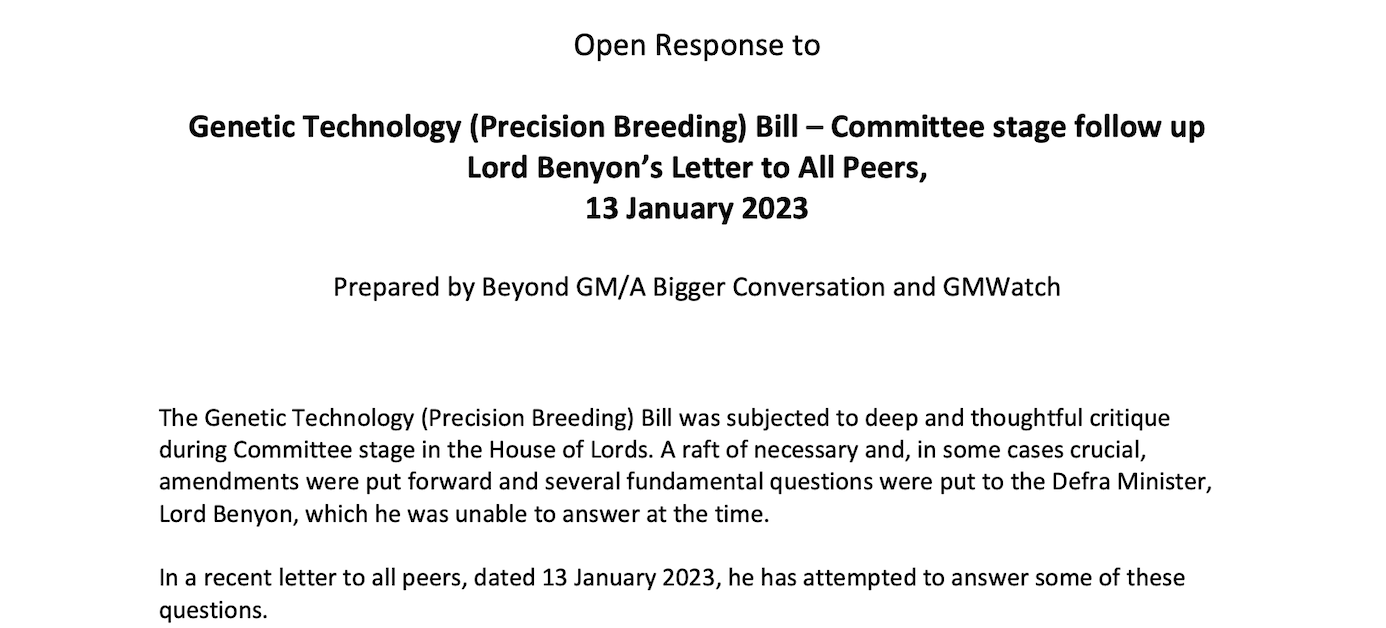Welcome to Review 538, which focuses on "new GM" and the push for deregulation of new GMOs in the EU, the UK, and worldwide.
NEW GM
Unintended genomic outcomes in current and next generation GM techniques
Older-style GM and new gene editing techniques, especially using CRISPR/Cas, increase the possibilities for modifying the genetic material in organisms. But legitimate safety concerns arise from the unintended genetic modifications that have been reported as side-effects of such techniques. An important recently published paper systematically reviewed the scientific literature for studies that have investigated unintended genomic alterations in modified plants. It showed a range of impacts of such techniques in host genomes, varying from small to large genomic variations. It also revealed a clear lack of detailed information on experimental designs in the publications examined. As unintended outcomes are directly correlated to the type of analytical method used to investigate DNA sequence alterations, most papers might underestimate these effects, due to lack of dedicated testing.
420,000-strong petition demanding safety checks and labelling for all GMOs is handed over to EU Commission
The EU Commission, pushed by agribusiness, plans to deregulate "new GMOs". That would mean no more safety checks or labelling requirements for GM foods and plants. More than 420,000 European citizens signed a petition asking the Commission to protect their right to choose what they produce and eat. The petition was handed over in front of a "wheel of fortune", symbolising gambling with food safety, to Klaus Berend from the Commission.
EU consultation on a legal framework for “new GMOs” sparks food traceability fears
A coalition of more than 50 food and environmental organisations have joined forces to oppose EU Commission proposals that could allow foods produced with "new genomic techniques" (NGTs) to circumnavigate GMO regulation and escape traceability in the food system. The organisations have gathered over 420,000 signatures against deregulating “new GMOs". “Currently, rules ensure traceability of new GMOs in the food system, which makes it possible for farmers to know that the seeds they purchase are GMO or not GMO,” Madeleine Coste of Slow Food Europe said.“If the European Commission proposes to change this, as we expect, there is a risk of weakening traceability. In addition, the Commission has not invested sufficiently to develop detection methods, to be able to test and identify when products have been obtained from NGT. There is a real need to develop these detection methods further,” Coste added.
Germany: No government support for GMO deregulation
In 2023, the governments of the EU member states will vote on the European Commission’s legislative proposal on new GMOs, which will be published in late spring. In a voting system where the weight of a state depends on the percentage of the population it represents, the position of the German government could prove decisive in the outcome of the vote. Since the change of government in December 2021, this position is not clearly decided. Germany’s position on the issue has changed since the parliamentary elections in December 2021. Its vote could prove decisive in the outcome of the Member States’ vote on the European Commission’s proposal. In the coalition government, new genetic modification techniques are viewed with skepticism in the Ministry of Agriculture and the Ministry of the Environment, both led by the Greens.
EU Commission's Berend admits GM hasn't produced much that's useful
In the process of talking up gene editing, Klaus Berend, the European Commission’s head of unit for pesticides and biocides, admitted that apart from herbicide tolerance, “not much has come out of the classical GMO techniques”. Berend also said, “It should be possible to have freedom of choice for those who want or don’t want to use GMOs."
Article debunks claims that gene editing will revolutionise crop breeding in Africa
Gene editing has captured the imagination of academics and professionals working on agricultural development in Africa. They claim the technology has the potential to revolutionise crop breeding, based on assertions of precision, cheapness and speed. However, these claims are strongly challenged in a new peer-reviewed article by an international group of development experts led by Joeva Sean Rock, Professor of Development Studies at the University of Cambridge, UK. The authors review the evidence and experience of older-style GM crops in Africa, as well as the research findings to date on gene editing. They conclude that unless hard lessons are learned from experience with first-generation GM crops, gene editing projects "are in danger of repeating mistakes of the past".
GMOs: EFSA suggests restricting the meaning of "transgenic"
On June 7, 2023, the European Commission might propose a modification of the regulatory framework for GMOs. Its goal is to have GMO obtained by "directed mutagenesis and cisgenesis" excluded from the requirements of labelling and risk assessment – requirements that would then apply only to transgenic GMOs. But, according to the European Food Safety Authority, the very notion of "transgenic" could also be modified. If EFSA and the Commission get their way, the number of GMOs that qualify as transgenic and which would remain subject to the current risk assessment and labelling requirements would be reduced. And the number of GMOs labelled as cisgenic that the Commission wants to exempt from risk assessment and labelling would increase.
Why new GM techniques must be strictly regulated
In a bid to counter the UK’s current trajectory of GMO deregulation, the secretary general of European Non-GMO Industry Association (ENGA) Heike Moldenhauer puts the case to maintain the status quo for strict regulation of new GMOs. She writes, "New genetic engineering techniques allow genomes to be modified to a previously impossible extent and at a previously impossible speed. These techniques – and only these techniques – render the whole genome accessible to changes; whereas in breeding, some regions of the genome are protected against mutations... The potential impacts of these alterations in terms of unintended consequences are not yet known, making regulation and risk assessment even more important."
Possible absence of traceability obligation for new GMOs gives patents unlimited power
The possible absence of a traceability obligation for "new GMOs" by the European Commission would give patents an unjustified and deleterious power over farmers and small seed companies, but also over biodiversity and food. The European Coordination Via Campesina (ECVC) published in November 2022 a report denouncing the causal link between GMO regulation and patent rights. It stresses that "the disappearance of the traceability requirement [for new GMOs] would lead to an abusive extension of the scope of patents, to the detriment of the guaranteed GMO-free agricultural sector and the rights of farmers and breeders with regard to seeds".
For EFSA, risk analysis of GMOs must become the exception
At the end of October 2022, European experts from the European Food Safety Authority (EFSA) published an opinion on the criteria to be followed to assess the risks associated with "plants produced by targeted mutagenesis, cisgenesis and intragenesis". While they confirm the absence of a history of safe use of these GMOs, they nevertheless recommend that risk assessment be reduced to a minimum. This opinion, which curiously never uses the term GMO, looks like a political order from the European Commission, which will propose, in 2023, a deregulation of these GMOs.
Researchers study unintended effects of gene editing in tomatoes
One method of gene editing is manipulating DNA methylation. Researchers at University of Connecticut's (UConn) College of Agriculture, Health and Natural Resources are studying the unintended effects of CRISPR/dCas editing on DNA methylation in gene-edited tomatoes. The researchers say they are trying to make the tomato more nutritious and tasty. However, A UConn press release says, "The potential unintended side effects of this process are not yet well-studied, so additional research is needed prior to introducing the technique for potential commercial agricultural applications."
UK GMO DEREGULATION
Top geneticist warns UK is embarking on experiment that could "cause great harm"
In the wake of a debate in the House of Lords in which the UK government's GMO deregulation bill – the Genetic Technology (Precision Breeding) Bill – passed the Report stage unamended, the renowned geneticist and House of Lords peer Lord Robert Winston warned that the bill could "cause great harm". Lord Winston is correct. While he and Green peer Natalie Bennett made especially strong and insightful speeches, the debate overall was disappointing. No peers pressed for labelling of these deregulated GMOs, doubtless because they felt the government would simply defeat the move. And most concerns centred around animals rather than plants.
Botched genetic technology bill will upend English agriculture
In the House of Lords, no substantive amendments were made to the Genetic Technology Bill and it is now largely in its final form. The expectation is that this inadequate, flawed, industry-led, scientifically, legally, economically and ethically dodgy bill will return to the House of Commons and be swiftly shunted into law before the spring, writes Pat Thomas of Beyond GM.
The GMO lobby misled UK Parliamentarians on gene editing
In discussions on the Genetic Technology (Precision Breeding) Bill, UK Parliamentarians in both Houses were misled with false, misleading, and biased information that ignores the concerns raised by the science underpinning gene editing technology. The false claims are not confined to the UK – variants of them are being used all over the world in debates about proposals to weaken the regulations around gene editing and other GM technologies. Dr Michael Antoniou and Claire Robinson have published their responses to the claims on GMWatch and the information has been shared with interested parties in the UK Parliament.
Scotland rejects the rollout of gene-edited food
The Scottish Parliament has refused consent for the Westminster government's Genetic Technology (Precision Breeding) Bill to be implemented in Scotland. Although the bill is directed towards England, Mairi McAllan, the Scottish environment and biodiversity minister, said it contained provisions that could allow UK ministers to impose gene editing in Scotland. McAllan said the bill meant that gene-edited products could be sold in Scotland without advisory labels and “unauthorised by Scottish ministers”. She said Scottish ministers had not been consulted on the drafting of the bill and UK ministers rejected their requests for amendments.
Wales joins Scotland in refusing rollout of deregulated GMO products
In common with the Scottish government, the Welsh government (the Senedd) has refused consent for the Genetic Technology (Precision Breeding) Bill, which deregulates certain classes of GMOs, to be implemented in Wales. The Welsh government is unhappy with the lack of labelling and traceability for deregulated GMOs, meaning that "Welsh Ministers’ ability to monitor, control or regulate the marketing of these products in Wales will be severely limited". This doesn’t stop the bill becoming law but might add stumbling blocks to some of the statutory instruments needed to complete the regulatory framework.
Approach gene edited crop claims "with cynicism"
Claims that gene editing could produce food with a higher nutrient density or cope better with adverse weather should be approached with cynicism, visitors to the UK's Oxford Real Farming Conference heard. This comes after the same declarations were made about genetic modification (GM) some 20 years ago, according to Liz O’Neill director of GM Freeze. She told the conference, “If you go back 25 years, GM was going to provide drought resistant, highly nutritious crops." However, the promises proved to be hollow – and now "All the same claims made in the early days of GM are now being made about [gene editing].”
UK GMO deregulation bill: Response to Lord Benyon's letter to peers
In January the Westminster government's Genetic Technology (Precision Breeding) Bill, which will deregulate GMO technologies, was subjected to deep and thoughtful critique during the Committee stage in the House of Lords. A raft of amendments were put forward and several fundamental questions were put to the DEFRA Minister, Lord Benyon, which he was unable to answer at the time. In a letter to all peers, dated 13 January 2023, he has attempted to answer some of these questions. His answers selectively omitted some important points raised in the House, while the answers to those he does address are inadequate and in some cases cause more confusion. GMWatch worked with Beyond GM to address some of these in an open letter, which we have published.
Science minister sees UK as "global testbed" for GMOs, other risky techs
British science after Brexit will need to set “realistic” ambitions if it is excluded from the EU’s own schemes, and focus on key areas where it can sustain a leading role, according to the UK science minister. George Freeman cited examples such as agritech and gene editing of crops; space; biosecurity; synthetic biology and research into functional foods. He said there is a “huge opportunity” for the UK in these areas because Brexit allows the country to become “a global testbed" and regulate in an “agile” and “responsive” way. In GMWatch's view, this raises the spectre of England and potentially the UK becoming the Hawaii of Europe in terms of playing host to acres of experimental GM crops, which are repeatedly sprayed with pesticides, causing serious health problems in exposed residents. See this article, for example.
Conflicts of interest in UK food regulation "puts public health at risk", argue experts
Food regulatory institutions in the UK should have robust mechanisms for addressing commercial conflicts of interest, argues a new article published in the journal Nature Food. The research, published jointly by Emeritus Professor Tim Lang of the Center for Food Policy, City, University of London, and Emeritus Professor Erik Millstone of the Science Policy Research Unit, at the University of Sussex Business School, suggests that not one of the bodies advising the Department for the Environment, Food & Rural Affairs (Defra) or the Food Standards Agency (FSA) is free from conflicts of interest. Their research highlights how the Advisory Committee on Releases to the Environment, which advises Defra ministers on the safety and acceptability on GM crops, consists of seven members, of whom only one declares no conflicts of interest. Furthermore, between the other six Committee members they have declared conflicts of interest with 16 different industrial corporations.
Majority of members of UK's new GMO regulatory committee have conflicts of interest
A large majority – seven out of eleven, or 64% – of the members of an important new subcommittee tasked with evaluating the safety of GM foods and animal feed have potential, probable, or definite conflicts of interest, in the form of vested interests in the liberalisation or commercialisation of GM technologies or related products, according to our analysis. Our finding comes shortly after the publication of an important paper in Nature Food, the highest ranking journal on food science and technology, which found extensive conflicts of interest in UK regulatory committees on GMOs and other food safety issues. The experts who undertook this analysis point out that conflicts of interest (COIs) are critical to public trust in decision making and conclude that ideally such regulatory or advisory bodies "should not include anyone with COIs that deserve to be declared".
Genies, once let out of the bottle, cannot be recaptured
Green Peer Natalie Bennett explains what's wrong with the UK government's Genetic Technology (Precision Breeding) Bill. She writes, "Having trashed the physical world, we’re now at risk of – through similar reductionist approaches – damaging the genetic world, the sophisticated, incredibly complex interactions that make up a living thing, which have developed over hundreds of millions of years."
..................................................................
We hope you’ve enjoyed this newsletter, which is made possible by readers’ donations. Please support our work with a one-off or regular donation. Thank you!





